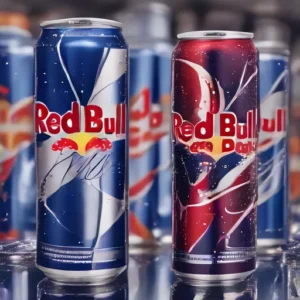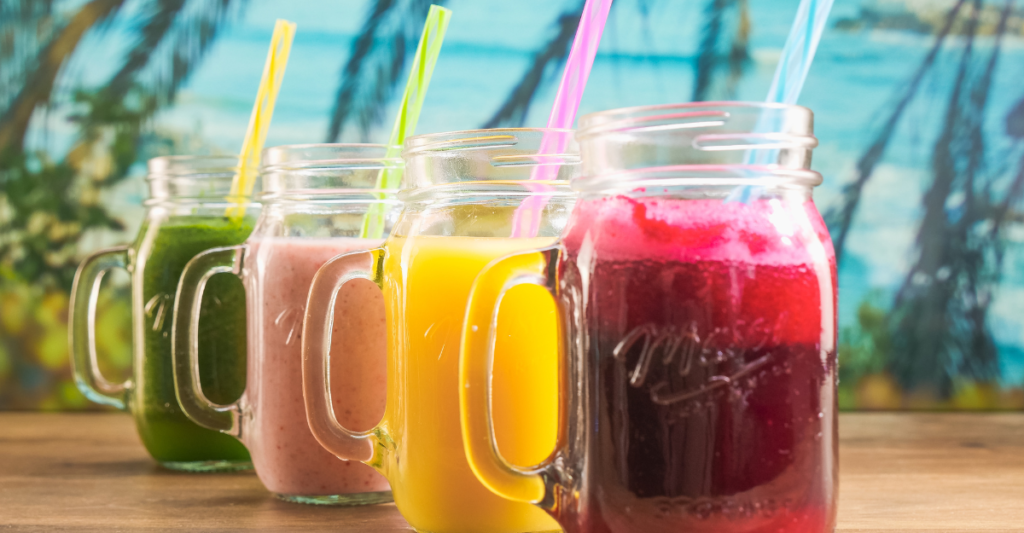When it comes to staying awake and alert, two popular choices are Red Bull and coffee. Both have their own unique properties, benefits, and drawbacks. In this article, we will discuss the complete details about the Red Bull vs Coffee and which one is best for you.
Nutrient Comparison: Red Bull vs. Coffee
| Nutrient/Component | Red Bull (8.4 fl oz/250 ml) | Black Coffee (8 fl oz/240 ml) |
| Calories | 110 | 2 |
| Caffeine | 80 mg | 95 mg |
| Sugar | 27 g | 0 g |
| Carbohydrates | 28 g | 0 g |
| Protein | 1 g | 0.3 g |
| Fat | 0 g | 0 g |
| B Vitamins | ||
| – Vitamin B6 | 250% DV (5 mg) | 2% DV (0.1 mg) |
| – Vitamin B12 | 80% DV (2 mcg) | 0% DV (0 mcg) |
| – Niacin (Vitamin B3) | 140% DV (28 mg) | 2% DV (0.5 mg) |
| – Pantothenic Acid (B5) | 50% DV (5 mg) | 1% DV (0.2 mg) |
| Taurine | 1000 mg | 0 mg |
| Sodium | 105 mg | 5 mg |
| Antioxidants | Minimal | High |
Also explore that how much Caffeine does a Red Bull have?
Red Bull vs. Coffee: Similarities and Differences

As someone who enjoys both Red Bull energy drink and coffee, I’ve often wondered about their similarities and differences. Let me share some insights based on facts and figures, ensuring the information is accurate and easy to understand. Also explore the Red Bull Vs Monster Energy drinks.
Similarities
- Caffeine Content: Both Red Bull and coffee are popular for their caffeine content, which helps boost energy and alertness. A standard 8.4 oz can of Red Bull contains about 80 mg of caffeine, while an 8 oz cup of brewed coffee typically contains between 95-200 mg of caffeine, depending on the type and brewing method.
- Purpose: Both beverages are consumed primarily for their stimulating effects. They help increase alertness, improve concentration, and combat fatigue. This makes them popular choices for students, professionals, and athletes.
- Popularity: Both drinks have a massive global following. Coffee has been a staple for centuries, while Red Bull, launched in 1987, quickly became one of the most popular energy drinks worldwide.
Differences
- Ingredients: Coffee is a natural beverage made from roasted coffee beans. It contains caffeine, antioxidants, and small amounts of vitamins and minerals. Red Bull, on the other hand, is a manufactured energy drink that includes caffeine, taurine, B vitamins, sugar (or artificial sweeteners in the sugar-free version), and various flavorings.
- Caloric Content: A regular 8.4 oz can of Red Bull contains about 110 calories, primarily from sugar (27 grams). In contrast, a cup of black coffee has virtually no calories (about 2 calories), making it a better option for those watching their calorie intake. Adding sugar, cream, or other flavorings to coffee will increase its calorie content.
- Additional Compounds: Coffee is rich in antioxidants, which can offer various health benefits, such as reducing the risk of certain diseases. Red Bull contains taurine and B vitamins, which are marketed to enhance physical and mental performance, although the scientific support for these claims is mixed.
- Health Effects: Moderate coffee consumption is often associated with several health benefits, including a reduced risk of certain chronic diseases like Parkinson’s, Alzheimer’s, and some types of cancer. Red Bull, due to its high sugar content and additives, can have negative health effects if consumed excessively, such as increased heart rate, high blood pressure, and potential for sugar crashes.
- Regulation and Availability: Coffee is widely available and can be prepared in numerous ways at home or purchased from various cafes. Red Bull is available as a pre-packaged drink in stores and vending machines, making it convenient but less versatile in terms of preparation.
Also explore that Does Red Bull Energy Drink Contain Alcohol?
Red Bull vs. Coffee: Effects on Health

When it comes to boosting energy, both Red Bull and coffee are popular choices. But how do they compare in terms of health effects? Also explore that Does Red Bull Expire?
Short-term effects:
- Both Red Bull and coffee can increase alertness and improve mood shortly after consumption due to caffeine.
- Red Bull’s sugar content can provide a quick energy boost, but this is often followed by a “sugar crash.”
Long-term effects:
- Red Bull: Regular consumption can lead to increased sugar intake, contributing to obesity, dental problems, and metabolic syndrome. High caffeine intake can also cause heart palpitations and high blood pressure.
- Coffee: Moderate coffee consumption (3-4 cups per day) has been associated with a lower risk of several chronic diseases, including Parkinson’s disease, Alzheimer’s disease, and certain types of cancer. It may also lower the risk of heart disease and improve longevity.
Also explore the side effects of Red Bull
Personal Experiences
Personally, I find that coffee gives me a steady energy boost without the crash that sometimes comes with sugary drinks like Red Bull.
When I drink coffee, I also appreciate its rich flavor and the ritual of brewing it. On the other hand, Red Bull can be convenient for a quick energy kick, especially in situations where I need to be alert fast and don’t have time to make coffee.
Which should you drink?

When choosing between Red Bull and coffee, consider your health and energy needs. Red Bull contains about 80 mg of caffeine per 8.4 oz can and 27 grams of sugar, which can lead to a quick energy boost but might cause a crash later.
Coffee, on the other hand, typically has 95 mg of caffeine per 8 oz cup and is sugar-free unless you add it.
Coffee provides a more sustained energy boost and is linked to various health benefits, such as reduced risk of certain diseases. For a healthier, more stable energy source, coffee is generally the better choice
Conclusion
Choosing between Red Bull and coffee depends on your lifestyle and health preferences. If you need a quick, convenient energy boost and don’t mind the sugar content, Red Bull might be your go-to. However, if you’re looking for a healthier, more sustained energy source with additional health benefits, coffee is likely the better choice.

